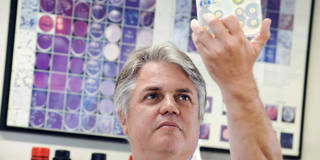Volvo's announcement that it will make only hybrid and electric cars after 2019 demonstrates that people and organizations are still capable of taking big, bold steps to solve major challenges. Among the many global problems today, the fight against antimicrobial resistance desperately needs its own breakthrough commitment.
LONDON – Last week, Volvo issued an inspiring announcement: it will no longer produce gasoline- or diesel-fueled cars after 2019. Volvo executives may be anticipating that traditional vehicles will be less profitable in the future. But whatever their motive, their decision has resonated widely. Within 24 hours, French President Emmanuel Macron announced that France would prohibit the sale of gasoline- and diesel-fueled cars by 2040.

LONDON – Last week, Volvo issued an inspiring announcement: it will no longer produce gasoline- or diesel-fueled cars after 2019. Volvo executives may be anticipating that traditional vehicles will be less profitable in the future. But whatever their motive, their decision has resonated widely. Within 24 hours, French President Emmanuel Macron announced that France would prohibit the sale of gasoline- and diesel-fueled cars by 2040.